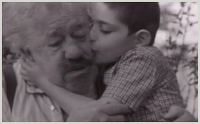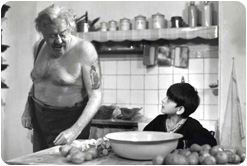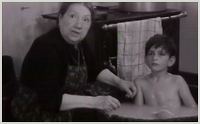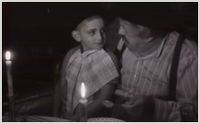

The Two of Us (Le Vieil Homme et L'enfant, 1967)
Director: Claude Berri
"I was 8 years old and already a Jew."
This statement seems an odd way for a narrator to introduce us to his reminiscences of youth - odd, that is, for people who had little more to do as children than to be themselves. But, Claude Berri did not grow up during ordinary times. He turned 8 in 1944 Paris, and being a Jew was the fact that governed his every move. How he came to love a Vichyist anti-Semite during the last year of World War II is recounted in the joyful and touching The Two of Us.
The film begins with young Claude Langmann (Alain Cohen) casing a toy store with a friend. His friend causes a distraction, and Claude stuffs one metal truck, then another, under his coat and attempts to leave. A large hand moves into the frame and lands
 on Claude's shoulder, and the chase is on. That evening, Claude's father (Charles Denner) performs a similar chase around the family furniture to administer a spanking to the mischievous Claude. Mr. Langmann doesn't have the usual worries of a father with a sticky-fingered son. The family's life is extremely precarious, and Mr. Langmann worries that the attention his son is attracting will lead authorities to discover their secret and mean their doom. He laments that Claude doesn't seem to understand the gravity of the situation and will not listen to him. Of course he doesn't. He's 8 and doesn't really understand what it means to other people that he is Jewish.
on Claude's shoulder, and the chase is on. That evening, Claude's father (Charles Denner) performs a similar chase around the family furniture to administer a spanking to the mischievous Claude. Mr. Langmann doesn't have the usual worries of a father with a sticky-fingered son. The family's life is extremely precarious, and Mr. Langmann worries that the attention his son is attracting will lead authorities to discover their secret and mean their doom. He laments that Claude doesn't seem to understand the gravity of the situation and will not listen to him. Of course he doesn't. He's 8 and doesn't really understand what it means to other people that he is Jewish.In the next couple of scenes, it is apparent that the Langmanns have moved house twice. Another prank - this time, smoking in the landlady's outhouse - is the final straw. Claude must be sent where he can do less harm. A woman who has taken the Langmanns in arranges for Claude to stay with her parents in the countryside, near Grenoble. She warns Claude's parents that although her father is a good man, he is a vocal anti-Semite and that Claude must be careful not to reveal his faith. Claude learns that his new name will be Longuet, that he must always bathe alone to conceal his circumcized penis, and that he must say the "Our Father" prayer at night before he goes to sleep. Mr. Langmann drills Claude on the prayer even as his train begins to carry him away. It is hard not to view the moving train and think where else trains took Jews in 1944.
When Claude and his patroness arrive, the old man (Michel Simon) welcomes the boy to climb in his lap and call him "Grandpa." He introduces Claude to his beloved dog Kinou, a sickly and ancient mongrel that seems to sense bombings and that the old man spoonfeeds at the dinner table. We are then treated to Sunday dinner, accompanied by Vichy propaganda on the radio and Grandpa's denunciation of meat eaters ("cannibals"), the English, Jews, Freemasons, and Bolsheviks. The old man's daughter quiets him with a sly reply, "You'd think you had a Jew living here." He replies, "That's all I need!" This sounds like a rocky start for the young Jewish boy.
But The Two of Us takes a different tack. Claude's life in his adopted home isn't at all disagreeable. In fact, it's practically paradise. He is enrolled at school, gets happily into the lice-check circle, and laughs when one infested boy faces the teacher's hair clipper. He is teased, too, as a "Paris brat, smells like a rat," a taunt just a little too close to Jew-baiting for the audience, but a perfectly normal occurrence among children. The teasing turns into a fistfight that leaves Claude with a cut on his head. Grandpa bursts with pride at the young boy's courage. "Grandma" (Luce Fabiole) predictably tells the old man not to encourage him.
 Grandpa talks to Claude about his pride in the great Marshall Petain and about his own service in the first World War. He shows Claude a scar, a bayonet wound, he says. Claude says, "It's on your back. Were you running away?" A flustered Grandpa then displays another wound in his gut. Claude says, "That's your appendicitis. My dad has a scar there." It's a funny scene, and Grandpa never gets mad. He loves Claude almost as much as he loves his dog - maybe more. His wife, he says to Claude when the boy remarks on a naked woman tattooed to his arm, is another story. "The first years are great, then..." In this house, Grandma is the boss.
Grandpa talks to Claude about his pride in the great Marshall Petain and about his own service in the first World War. He shows Claude a scar, a bayonet wound, he says. Claude says, "It's on your back. Were you running away?" A flustered Grandpa then displays another wound in his gut. Claude says, "That's your appendicitis. My dad has a scar there." It's a funny scene, and Grandpa never gets mad. He loves Claude almost as much as he loves his dog - maybe more. His wife, he says to Claude when the boy remarks on a naked woman tattooed to his arm, is another story. "The first years are great, then..." In this house, Grandma is the boss. One order Grandma gives Claude is not obeyed. She pours him a bath and briefly leaves the room. Claude undresses quickly and begins to wash. Grandma returns and tells him to stand in the tub so she can wash him. They are already late for church. Remembering what his mother said, Claude refuses. "Don't you want me to see your birdie?" she asks. "I've seen them before." Claude is adamant, and Grandpa backs him up. "That's right," he says. "Don't let her fool around with it."
One order Grandma gives Claude is not obeyed. She pours him a bath and briefly leaves the room. Claude undresses quickly and begins to wash. Grandma returns and tells him to stand in the tub so she can wash him. They are already late for church. Remembering what his mother said, Claude refuses. "Don't you want me to see your birdie?" she asks. "I've seen them before." Claude is adamant, and Grandpa backs him up. "That's right," he says. "Don't let her fool around with it."Claude asks Grandpa a lot of questions about Jews. "How can you tell a Jew?" "They smell." "Even if they wash?" "It's like a goat. You can wash it for 3 hours, and 15 minutes later, it stinks again." Jews have hooked noses to smell out money. On the Sabbath, Jews use no electricity and eat by candlelight. Jews wear their hats indoors while they eat. They have curly hair and big ears. Later, Claude decides to play a joke on the old folks. He knocks at their bedroom door and announces ominously that he's become one of them. "Who?" asks Grandpa. "A Jew." Grandma scolds Grandpa for telling him stories about Jews and giving him nightmares. Grandpa assures him that he has a fine straight nose and couldn't possibly be
 a Jew. Inviting Claude to sleep with him, Grandpa says, "Now, would I let a Jew sleep in my bed?" That Claude can play this joke with such good humor shows a love and compassion for a man who clearly doesn't know what he's talking about. Later, when the electricity goes out during dinner, they must eat by candlelight. "We are eating like Jews," says Claude. For once, Grandpa accepts this without comment. Love for the boy and the joy of being a grandfather seem to be lightening his reflexive bigotry.
a Jew. Inviting Claude to sleep with him, Grandpa says, "Now, would I let a Jew sleep in my bed?" That Claude can play this joke with such good humor shows a love and compassion for a man who clearly doesn't know what he's talking about. Later, when the electricity goes out during dinner, they must eat by candlelight. "We are eating like Jews," says Claude. For once, Grandpa accepts this without comment. Love for the boy and the joy of being a grandfather seem to be lightening his reflexive bigotry.But Claude never reveals his faith. Grandpa finds Kinou agitated one morning, and then goes to the calendar to pull off the slip of paper from the previous day. The new date, June 5, 1944, is D-Day and, according to Grandpa, the invasion kills the prescient Kinou. Liberation celebrants fill the streets of the small town. Grandpa and Grandma sadly remove Petain's picture from their wall and put it away. They know that Claude, too, will be leaving soon. When Claude's parents drive off with him on a bus, Claude smiles and waves out the back window to the sad couple who looked after him so well, loved him, and let him be a child for a few short months. Giving a little Jewish boy a childhood in the shadow of unspeakable death was a great gift indeed. It is no wonder that Berri paid them back with such a beautiful, funny, heartfelt film that doesn't forget the seriousness of the times but never collapses into them. l


0 Comments:
Post a Comment
<< Home